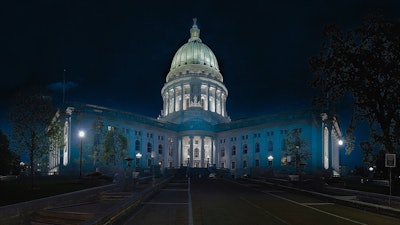
*Editor's Note: The original article appeared on September 18 and was updated with further information on September 20, and once again on November 5.
The U.S. Federal Reserve announced on October 30 it will cut interest rates for the third time in 2019. The decision came about due to a slowing U.S. economy and global slump, reports The Hill.
An 8 to 2 vote by the Federal Open Markets Committee (FOMC) chose to cut baseline interest rates by 0.25 percentage points to a 1.5-1.75% target. The FOMC said it would continue to monitor the economic outlook to assess the best target range for interest rates.
A statement from the FOMC—which is the central bank's policymaking arm–indicates the Federal Reserve believes cutting rates at this time shows a belief the economy will grow, add jobs and push prices and wages higher. However, it also says uncertainties about this outlook remain.
The U.S. economy has steadily slowed throughout 2019; U.S. gross domestic product rose at an annualized rate of 1.9% in the third quarter and average monthly job gains fell to 161,000 in 2019. October's job report is expected to show minimal employment gains, as well.
Business investment in equipment and structures, manufacturing output and exports have all declined due to reductions in global demand for U.S. goods and services–likely due to the various tariffs imposed by the Trump administration.
Read more: U.S. Imposing Tariffs on EU Heavy Machinery
In September, The Hill reported the second set of interest rate cuts as a means of protecting a record stretch of U.S. prosperity from potential foreign risks.
Interest rates were cut 0.25 percentage points to a 1.75-2% baseline range. This was the second time since July rates have been cut to ease borrowing costs for businesses and consumers.
Federal Reserve Chairman Jerome Powell has insinuated over the past several months the cuts would be coming in order to prevent a possible recession. Economists don't believe a recession is imminent, but downward trends in many markets and other economic factors don't completely rule it out either.
Read more in the article "Tailwinds Have Turned into Headwinds."
Declining global growth, continued trade tensions—particularly those between the U.S. and China—and several geopolitical issues around the world factored into the Fed's decision. The hope is cutting rates will stimulate the slightly slowing U.S. economy enough to prevent a possible recession.
President Trump, however, has insisted the Fed aid the trade war with China by lowering rates even further to weaken the U.S. dollar. His reasoning being the currently strong U.S. dollar is hindering exports for American businesses.
Powell has said the trade war is negatively affecting the economy, and is partially responsible for a recession in the manufacturing sector, and declining monthly average job gains. It is also causing companies to reduce or pause investment and expansion plans due to the uncertainty of the political and economic climate.
Read "Tariffs Cost American Businesses $6.8 Billion in July" to learn more.
Some members of the Federal Reserve are in agreement with the President that the interest rate should have been cut further. St. Louis Federal Reserve Bank President James Bullard said he argued for a deeper cut from what was approved by the Fed, reports CNBC. He notes fears the economy is slowing and manufacturing already being in a recession as his reasonings.
CNBC quotes Bullard as stating, "In my view, lowering the target range by 50 basis points to 1.50%-1.75% would have been a more appropriate action."
Meanwhile, two other members of the policymaking Federal Open Market Committee (FOMC) have said rates should not have been cut at all. Boston Fed President Eric Rosengren additional stimulus is not necessary for an economy with an already tight labor market. He said the cuts risk further inflating prices of risky assets and that consumers and businesses may take on too much leverage due to the rate cuts.
Members of the FOMC are split with some saying more cuts may yet be made this year while others say there won't be any others. And others, like Rosengren don't believe cuts should be made at all.



















